九年级英语上册Unit6TV programmes Period4 Integrated skills Study skills上课课件(共28张PPT)牛津译林版
文档属性
| 名称 | 九年级英语上册Unit6TV programmes Period4 Integrated skills Study skills上课课件(共28张PPT)牛津译林版 | 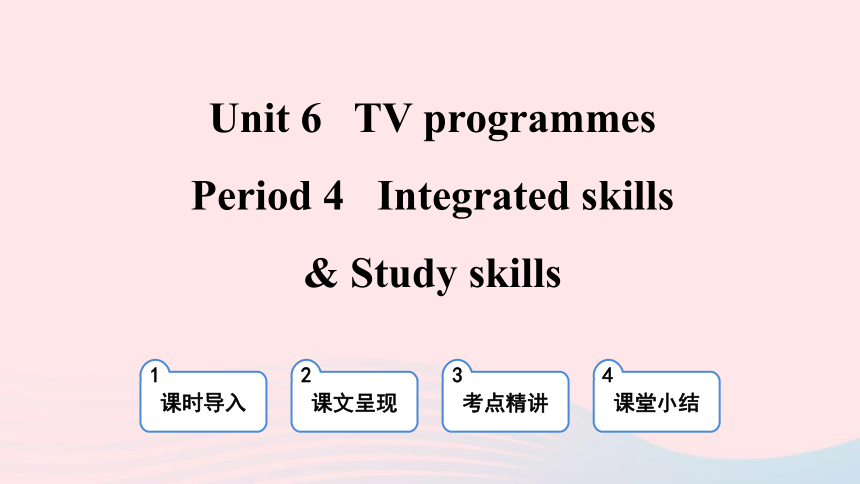 | |
| 格式 | pptx | ||
| 文件大小 | 3.3MB | ||
| 资源类型 | 教案 | ||
| 版本资源 | 牛津译林版 | ||
| 科目 | 英语 | ||
| 更新时间 | 2025-02-16 11:07:20 | ||
图片预览



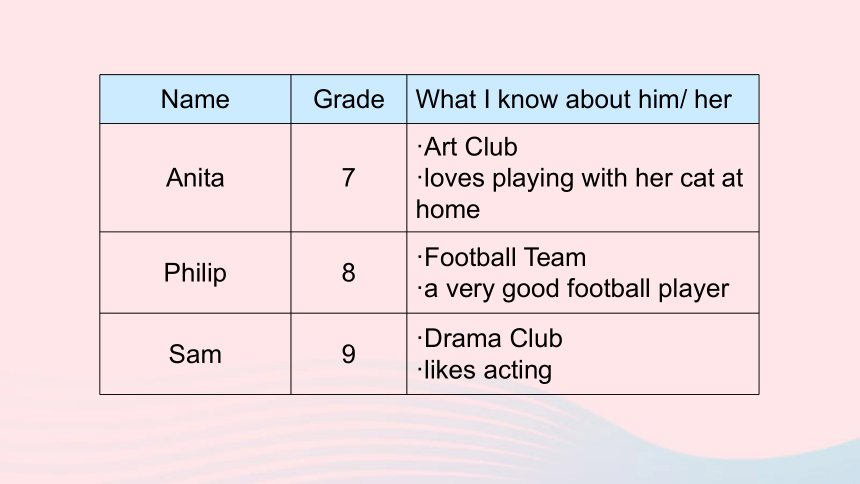
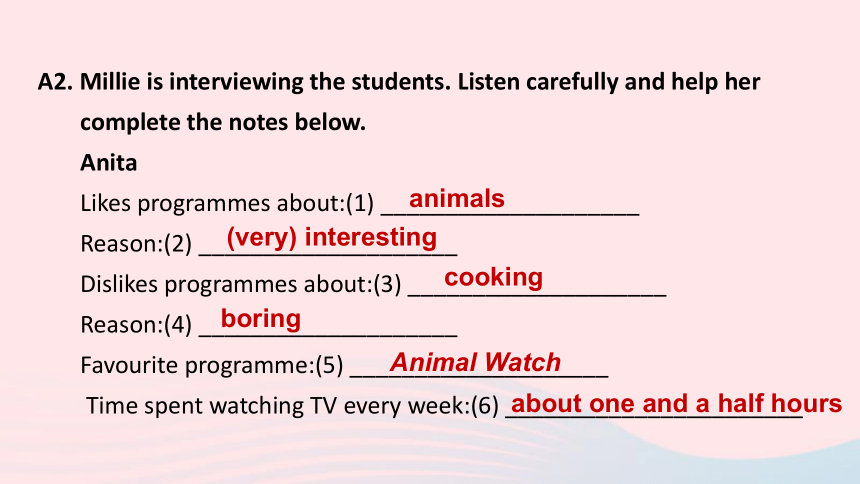
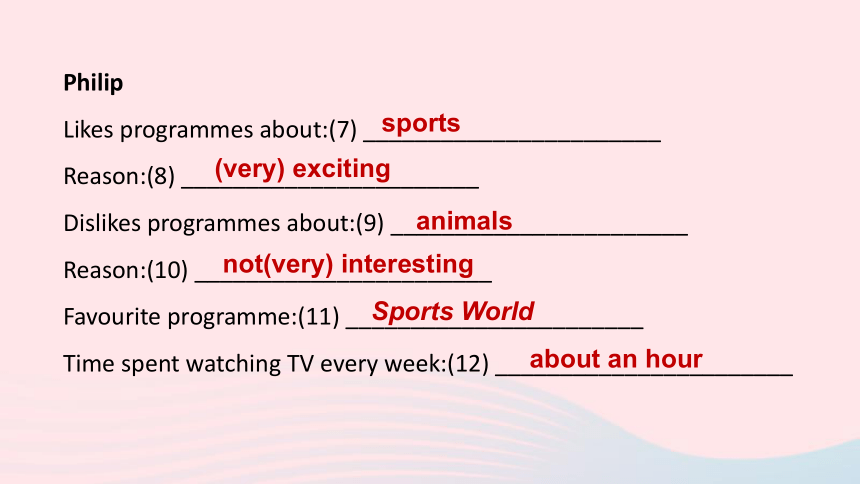
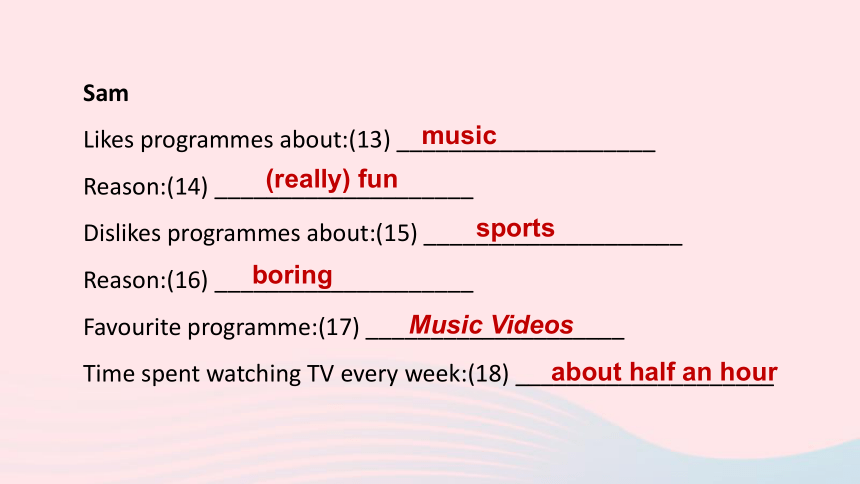
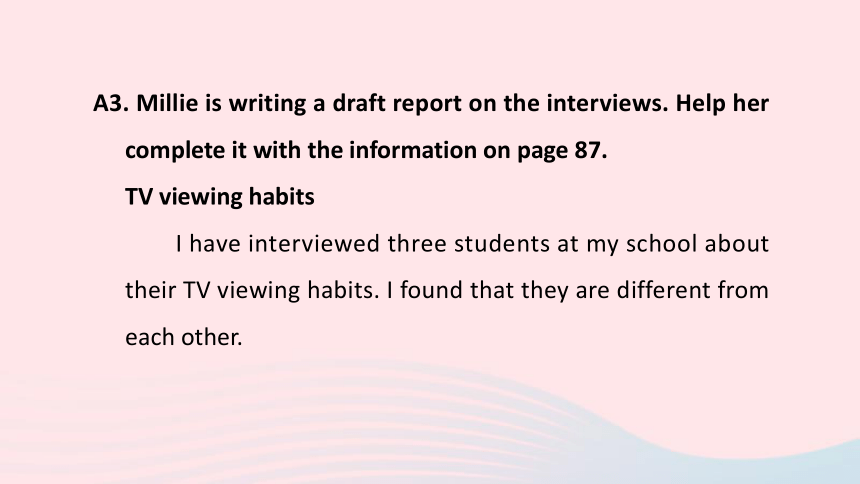
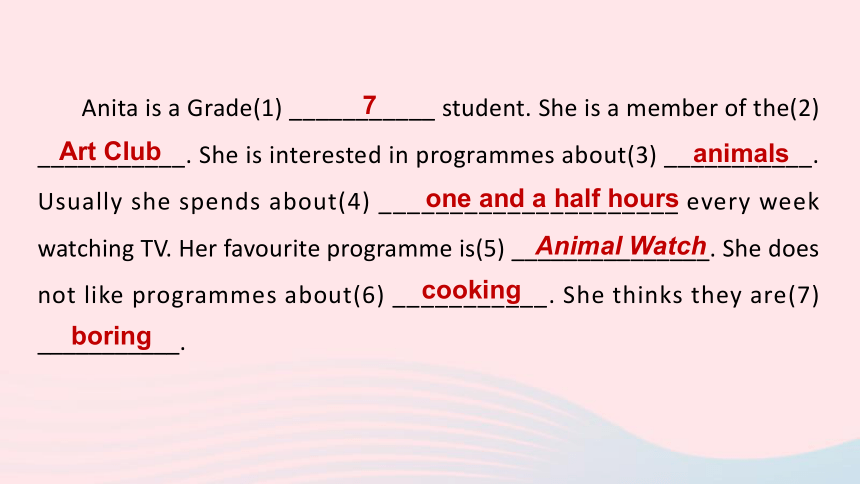
文档简介
(共28张PPT)
Unit 6 TV programmes
Period 4 Integrated skills
& Study skills
1
课时导入
2
课文呈现
3
考点精讲
4
课堂小结
Drama series
Chat show
Documentary
Cartoon
Game show
Comedy
Integrated skills
A. TV viewing habits
A1. Millie wants to interview three students about their TV viewing habits. She has written down what she knew about the students before the interviews. Read the information below.
habit 的常用搭配:
① have the habit of... 具有……的习惯
② break the habit of... 改掉……的习惯
③ get into the/a habit of... 养成……的习惯
Name Grade What I know about him/ her
Anita 7 ·Art Club
·loves playing with her cat at home
Philip 8 ·Football Team
·a very good football player
Sam 9 ·Drama Club
·likes acting
A2. Millie is interviewing the students. Listen carefully and help her complete the notes below.
Anita
Likes programmes about:(1) ____________________
Reason:(2) ____________________
Dislikes programmes about:(3) ____________________
Reason:(4) ____________________
Favourite programme:(5) ____________________
Time spent watching TV every week:(6) _______________________
animals
(very) interesting
cooking
boring
Animal Watch
about one and a half hours
Philip
Likes programmes about:(7) _______________________
Reason:(8) _______________________
Dislikes programmes about:(9) _______________________
Reason:(10) _______________________
Favourite programme:(11) _______________________
Time spent watching TV every week:(12) _______________________
sports
(very) exciting
animals
not(very) interesting
Sports World
about an hour
Sam
Likes programmes about:(13) ____________________
Reason:(14) ____________________
Dislikes programmes about:(15) ____________________
Reason:(16) ____________________
Favourite programme:(17) ____________________
Time spent watching TV every week:(18) ____________________
music
(really) fun
sports
boring
Music Videos
about half an hour
A3. Millie is writing a draft report on the interviews. Help her complete it with the information on page 87.
TV viewing habits
I have interviewed three students at my school about their TV viewing habits. I found that they are different from each other.
Anita is a Grade(1) ___________ student. She is a member of the(2) ___________. She is interested in programmes about(3) ___________. Usually she spends about(4) _____________________ every week watching TV. Her favourite programme is(5) _______________. She does not like programmes about(6) ___________. She thinks they are(7) ___________.
7
Art Club
animals
one and a half hours
Animal Watch
cooking
boring
Philip is a Grade(8) ___________ student. He is a very good(9) ______________, so he likes programmes about(10) ___________. He thinks they are very(11) ___________. His favourite TV programme is (12) _____________. He spends about(13) ___________ every week watching TV. He does not like programmes about(14) ___________ —he does not find them(15) ___________.
8
football player
sports
exciting
Sports World
an hour
animals
interesting
Sam is a Grade(16) ___________student. He is a member of the(17) ___________ . He likes(18) ___________ programmes because he thinks they are really(19) ___________. His favourite programme is(20) ___________. He watches TV for about(21) ___________ every week. He finds programmes about(22) ___________ boring.
9
Drama Club
music
fun
Music Videos
half an hour
sports
Simon: Do you like TV ads, Millie
Millie : Yes. They’re interesting.
Simon : Why do you think so
Millie : I think some of them are really creative. How about you
Simon : I hate them.
Millie: Why
Simon : I think most of them are silly. ① Watching TV ads is just a waste of time. ②
温馨提示:此符号表示“考点精讲点拨”链接。
Study skills
How to read a newspaper
When you read a newspaper, you should skim the headlines first. They will tell you the topic of each article.
Newspaper headlines use the present tense. Some words are left out to save space, including a/an/ the, do/does/did, the verb be and and/but/or.
A. Read the newspaper headlines below. Pay attention to the tense and the words left out.
1. The Driver was killed, and eight were hurt in a bus crash
2. Heavy fog delays flights in Xinjiang
3. A Cat show was held in Shanghai
4. New artist sweeps American Music Awards
5. Here are some Xi’an travel tips
Newspapers use a special style of writing. Usually the most important information—the who, what, where, when and how— comes first in an article. The details come next, from the most important details to the least important ones.
Newspaper articles
Most important
↓
Least important
B. Read the article below. Then answer the questions.
TIP
In newspaper headlines, the present tense is used for immediate past information to draw the readers in.
Popular poet passes away
Susan Hunter, a poet whose poems were loved by millions, died of cancer on Tuesday in London. She was 73.
Ms Hunter wrote hundreds of poems. They were mostly about home, family and life in the countryside. People around the country grew up listening to her poems on the radio, and her books have always been popular. She was also famous for helping other young poets get their start, and she taught writing at universities.
1. Who was Susan Hunter
_______________________________________
2. What happened to her
_______________________________________
3. Where did she die
_______________________________________
A poet.
She died.
In London.
4. When did she die
_______________________________________
5. How did she die
_______________________________________
On Tuesday.
She died of cancer.
silly /'s li/ adj. 愚蠢的; 傻的
e.g. It was silly of you to trust him.
你居然相信他,真傻。
Ask a silly question and get a silly answer.
问得傻,答得蠢。
考点1
知识点
1
I think most of them are silly.
It’s silly of sb. to do sth.
某人做某事真傻。
拓展:silly 用作形容词,意为“愚蠢的; 傻的”,其比较级为sillier; 最高级为silliest。可用作名词,意为“傻孩子,淘气鬼”。
e.g. That’s the silliest idea I’ve ever heard!
那是我所听到过最愚蠢的想法!
Listen, silly, we have to leave now.
听着,淘气鬼, 我们现在得走了。
考题1:I think this may be the _________ (silly) mistake I’ve ever made.
silliest
返回
温馨提示:可返回原文
(高频) waste /we st/ v. 浪费; 滥用 n. 浪费; 垃圾
e.g. It’s only a waste of time to speak to her.
和她说话纯粹是浪费时间。
Don’t buy that book. It’s a waste of money.
不要买那本书。纯粹是浪费钱。
考点2
知识点
2
Watching TV ads is just a waste of time.
waste 的一词多义
n. 浪费,a waste of... n. 垃圾
waste (v.)的常用词组:
① waste sth. on sth.
(在某方面) 浪费某物
② waste sth. (in) doing sth.
浪费某物做某事
拓展:waste 作及物动词,意为“浪费”。
e.g. Don’t waste your money on these useless things.
不要把你的钱浪费在这些没用的东西上。
You’re wasting your time trying to explain it to him.
你跟他解释是在浪费时间。
考题2:[常州模拟] 让水龙头一直开着真是浪费水!
What ___________________________________________!
【点拨】It is a waste of water to do sth. 做某事浪费水。leave the tap running 让水龙头一直开着。根据句意可知是感叹句,句子用一般现在时,句型结构为:What +a/an(+ 形容词) + 单数名词+ 主语+ 谓语动词!故答案为a waste of water it is to leave the tap running。
a waste of water it is to leave the tap running
返回
本节课主要学习了:
重点单词:silly , waste
重点短语:a waste of time
Unit 6 TV programmes
Period 4 Integrated skills
& Study skills
1
课时导入
2
课文呈现
3
考点精讲
4
课堂小结
Drama series
Chat show
Documentary
Cartoon
Game show
Comedy
Integrated skills
A. TV viewing habits
A1. Millie wants to interview three students about their TV viewing habits. She has written down what she knew about the students before the interviews. Read the information below.
habit 的常用搭配:
① have the habit of... 具有……的习惯
② break the habit of... 改掉……的习惯
③ get into the/a habit of... 养成……的习惯
Name Grade What I know about him/ her
Anita 7 ·Art Club
·loves playing with her cat at home
Philip 8 ·Football Team
·a very good football player
Sam 9 ·Drama Club
·likes acting
A2. Millie is interviewing the students. Listen carefully and help her complete the notes below.
Anita
Likes programmes about:(1) ____________________
Reason:(2) ____________________
Dislikes programmes about:(3) ____________________
Reason:(4) ____________________
Favourite programme:(5) ____________________
Time spent watching TV every week:(6) _______________________
animals
(very) interesting
cooking
boring
Animal Watch
about one and a half hours
Philip
Likes programmes about:(7) _______________________
Reason:(8) _______________________
Dislikes programmes about:(9) _______________________
Reason:(10) _______________________
Favourite programme:(11) _______________________
Time spent watching TV every week:(12) _______________________
sports
(very) exciting
animals
not(very) interesting
Sports World
about an hour
Sam
Likes programmes about:(13) ____________________
Reason:(14) ____________________
Dislikes programmes about:(15) ____________________
Reason:(16) ____________________
Favourite programme:(17) ____________________
Time spent watching TV every week:(18) ____________________
music
(really) fun
sports
boring
Music Videos
about half an hour
A3. Millie is writing a draft report on the interviews. Help her complete it with the information on page 87.
TV viewing habits
I have interviewed three students at my school about their TV viewing habits. I found that they are different from each other.
Anita is a Grade(1) ___________ student. She is a member of the(2) ___________. She is interested in programmes about(3) ___________. Usually she spends about(4) _____________________ every week watching TV. Her favourite programme is(5) _______________. She does not like programmes about(6) ___________. She thinks they are(7) ___________.
7
Art Club
animals
one and a half hours
Animal Watch
cooking
boring
Philip is a Grade(8) ___________ student. He is a very good(9) ______________, so he likes programmes about(10) ___________. He thinks they are very(11) ___________. His favourite TV programme is (12) _____________. He spends about(13) ___________ every week watching TV. He does not like programmes about(14) ___________ —he does not find them(15) ___________.
8
football player
sports
exciting
Sports World
an hour
animals
interesting
Sam is a Grade(16) ___________student. He is a member of the(17) ___________ . He likes(18) ___________ programmes because he thinks they are really(19) ___________. His favourite programme is(20) ___________. He watches TV for about(21) ___________ every week. He finds programmes about(22) ___________ boring.
9
Drama Club
music
fun
Music Videos
half an hour
sports
Simon: Do you like TV ads, Millie
Millie : Yes. They’re interesting.
Simon : Why do you think so
Millie : I think some of them are really creative. How about you
Simon : I hate them.
Millie: Why
Simon : I think most of them are silly. ① Watching TV ads is just a waste of time. ②
温馨提示:此符号表示“考点精讲点拨”链接。
Study skills
How to read a newspaper
When you read a newspaper, you should skim the headlines first. They will tell you the topic of each article.
Newspaper headlines use the present tense. Some words are left out to save space, including a/an/ the, do/does/did, the verb be and and/but/or.
A. Read the newspaper headlines below. Pay attention to the tense and the words left out.
1. The Driver was killed, and eight were hurt in a bus crash
2. Heavy fog delays flights in Xinjiang
3. A Cat show was held in Shanghai
4. New artist sweeps American Music Awards
5. Here are some Xi’an travel tips
Newspapers use a special style of writing. Usually the most important information—the who, what, where, when and how— comes first in an article. The details come next, from the most important details to the least important ones.
Newspaper articles
Most important
↓
Least important
B. Read the article below. Then answer the questions.
TIP
In newspaper headlines, the present tense is used for immediate past information to draw the readers in.
Popular poet passes away
Susan Hunter, a poet whose poems were loved by millions, died of cancer on Tuesday in London. She was 73.
Ms Hunter wrote hundreds of poems. They were mostly about home, family and life in the countryside. People around the country grew up listening to her poems on the radio, and her books have always been popular. She was also famous for helping other young poets get their start, and she taught writing at universities.
1. Who was Susan Hunter
_______________________________________
2. What happened to her
_______________________________________
3. Where did she die
_______________________________________
A poet.
She died.
In London.
4. When did she die
_______________________________________
5. How did she die
_______________________________________
On Tuesday.
She died of cancer.
silly /'s li/ adj. 愚蠢的; 傻的
e.g. It was silly of you to trust him.
你居然相信他,真傻。
Ask a silly question and get a silly answer.
问得傻,答得蠢。
考点1
知识点
1
I think most of them are silly.
It’s silly of sb. to do sth.
某人做某事真傻。
拓展:silly 用作形容词,意为“愚蠢的; 傻的”,其比较级为sillier; 最高级为silliest。可用作名词,意为“傻孩子,淘气鬼”。
e.g. That’s the silliest idea I’ve ever heard!
那是我所听到过最愚蠢的想法!
Listen, silly, we have to leave now.
听着,淘气鬼, 我们现在得走了。
考题1:I think this may be the _________ (silly) mistake I’ve ever made.
silliest
返回
温馨提示:可返回原文
(高频) waste /we st/ v. 浪费; 滥用 n. 浪费; 垃圾
e.g. It’s only a waste of time to speak to her.
和她说话纯粹是浪费时间。
Don’t buy that book. It’s a waste of money.
不要买那本书。纯粹是浪费钱。
考点2
知识点
2
Watching TV ads is just a waste of time.
waste 的一词多义
n. 浪费,a waste of... n. 垃圾
waste (v.)的常用词组:
① waste sth. on sth.
(在某方面) 浪费某物
② waste sth. (in) doing sth.
浪费某物做某事
拓展:waste 作及物动词,意为“浪费”。
e.g. Don’t waste your money on these useless things.
不要把你的钱浪费在这些没用的东西上。
You’re wasting your time trying to explain it to him.
你跟他解释是在浪费时间。
考题2:[常州模拟] 让水龙头一直开着真是浪费水!
What ___________________________________________!
【点拨】It is a waste of water to do sth. 做某事浪费水。leave the tap running 让水龙头一直开着。根据句意可知是感叹句,句子用一般现在时,句型结构为:What +a/an(+ 形容词) + 单数名词+ 主语+ 谓语动词!故答案为a waste of water it is to leave the tap running。
a waste of water it is to leave the tap running
返回
本节课主要学习了:
重点单词:silly , waste
重点短语:a waste of time
